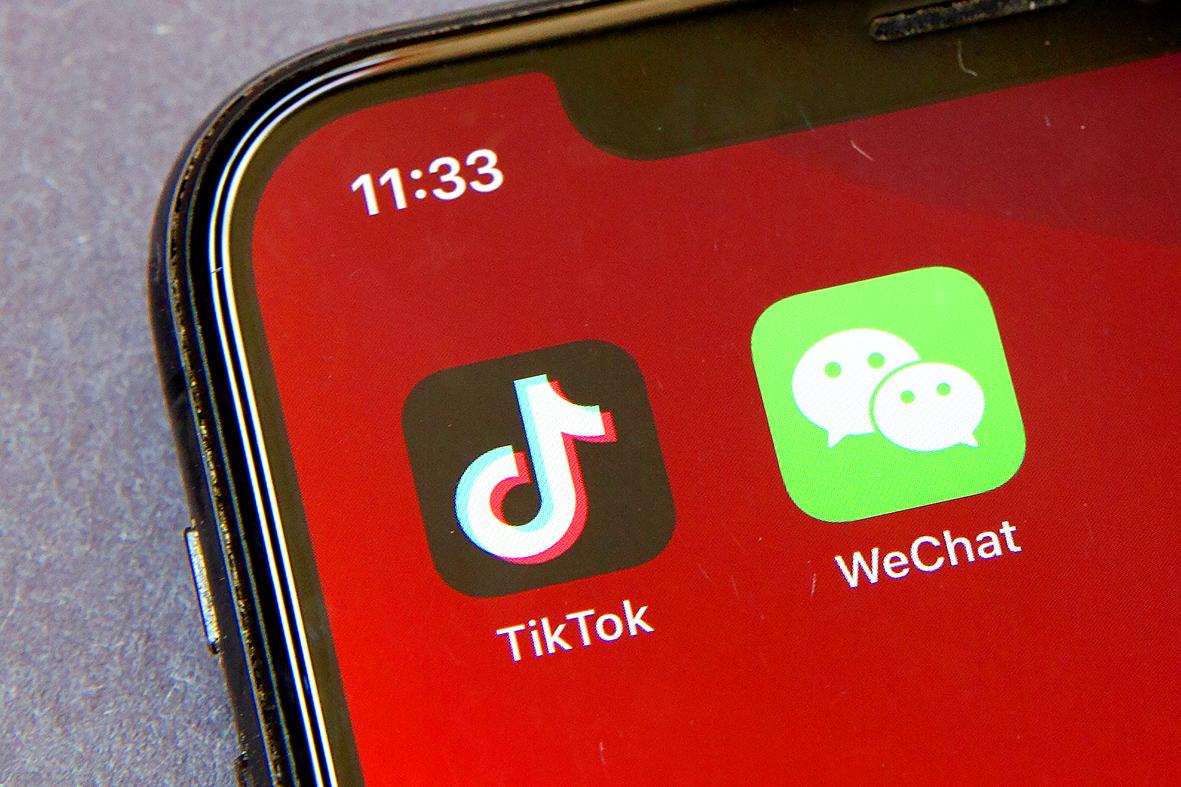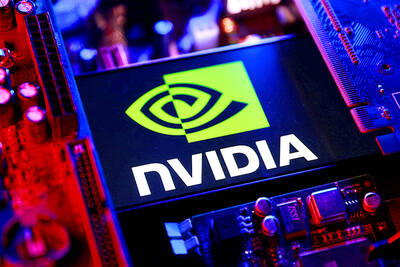Chinese consumers could boycott Apple Inc if the US bans WeChat, the Chinese Ministry of Foreign Affairs said yesterday, as the clock ticks down on a US order to block the popular social app.
US President Donald Trump this month announced a ban from the middle of next month on WeChat and another Chinese-owned app, TikTok, accusing them of threatening national security, further stoking tensions between Beijing and Washington.
However, ministry spokesman Zhao Lijian (趙立堅) tweeted yesterday: “If WeChat is banned, then there will be no reason why Chinese shall keep iPhone and apple products.”

Photo: AP
Zhao had already on Thursday said “many Chinese people are saying they may stop using iPhones if WeChat is banned in the US,” and accused Washington of “systematic economic bullying of non-US companies” by targeting the Chinese app.
The comments mark a rare direct reference by Beijing to boycotting a US product and come as the superpowers spar on multiple fronts, including military activity in the South China Sea, Hong Kong and blame for COVID-19.
Chinese social media users yesterday responded with mixed feelings to Zhao’s warning on Twitter, which is blocked in China, but accessible through virtual private network software.
“I use Apple, but I also love my country,” one user on Sina Weibo said. “It’s not a conflict.”
“No matter how good Apple is, it’s just a phone. It can be replaced, but WeChat is different,” another user said. “Modern Chinese people will lose their soul if they leave WeChat, especially businesspeople.”
Wechat, known in China as Weixin (微信), has more than 1.2 billion active users.
Trump’s executive order against WeChat forces the platform to end all operations in the US and bans Americans doing business with it.
Apple accounted for 8 percent of China’s smartphone market in the second quarter of this year, according to Counterpoint Research, far behind domestic leader Huawei Technologies Co (華為).

POWERING UP: PSUs for AI servers made up about 50% of Delta’s total server PSU revenue during the first three quarters of last year, the company said Power supply and electronic components maker Delta Electronics Inc (台達電) reported record-high revenue of NT$161.61 billion (US$5.11 billion) for last quarter and said it remains positive about this quarter. Last quarter’s figure was up 7.6 percent from the previous quarter and 41.51 percent higher than a year earlier, and largely in line with Yuanta Securities Investment Consulting Co’s (元大投顧) forecast of NT$160 billion. Delta’s annual revenue last year rose 31.76 percent year-on-year to NT$554.89 billion, also a record high for the company. Its strong performance reflected continued demand for high-performance power solutions and advanced liquid-cooling products used in artificial intelligence (AI) data centers,

SIZE MATTERS: TSMC started phasing out 8-inch wafer production last year, while Samsung is more aggressively retiring 8-inch capacity, TrendForce said Chipmakers are expected to raise prices of 8-inch wafers by up to 20 percent this year on concern over supply constraints as major contract chipmakers Taiwan Semiconductor Manufacturing Co (TSMC, 台積電) and Samsung Electronics Co gradually retire less advanced wafer capacity, TrendForce Corp (集邦科技) said yesterday. It is the first significant across-the-board price hike since a global semiconductor correction in 2023, the Taipei-based market researcher said in a report. Global 8-inch wafer capacity slid 0.3 percent year-on-year last year, although 8-inch wafer prices still hovered at relatively stable levels throughout the year, TrendForce said. The downward trend is expected to continue this year,

A proposed billionaires’ tax in California has ignited a political uproar in Silicon Valley, with tech titans threatening to leave the state while California Governor Gavin Newsom of the Democratic Party maneuvers to defeat a levy that he fears would lead to an exodus of wealth. A technology mecca, California has more billionaires than any other US state — a few hundred, by some estimates. About half its personal income tax revenue, a financial backbone in the nearly US$350 billion budget, comes from the top 1 percent of earners. A large healthcare union is attempting to place a proposal before

‘BASICALLY A BAN’: Sources said the wording governing H200 imports from officials was severe, but added that the regulations might change if the situation evolves Chinese customs authorities told customs agents this week that Nvidia Corp’s H200 artificial intelligence (AI) chips are not permitted to enter China, three people briefed on the matter said. Chinese government officials also summoned domestic technology companies to meetings on Tuesday, at which they were explicitly instructed not to purchase the chips unless necessary, two of the people and a third source said. “The wording from the officials is so severe that it is basically a ban for now, though this might change in the future should things evolve,” one of the people said. The H200, Nvidia’s second-most powerful AI chip, is one